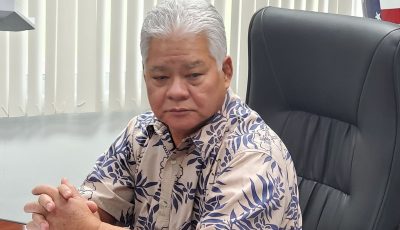Half-breed culture
Note: Adapted from an article I wrote, “Culture Shock: American Islanders at St. Anne’s Belfield,” which was previously published in my high school magazine, PERSPECTIVES, in the summer of 2009.
I graduated from a small high school, St. Anne’s Belfield (STAB), in Charlottesville, Virginia (yes, that Charlottesville) a little over 30 years ago. In spite of recent national news about racially charged events in Charlottesville, that town (my town) is forever etched on my mind as a very special place with some of the most brilliant and kind people I have ever had the pleasure of knowing. And yes, we have racism there like everywhere else and “We all should rise above the clouds of ignorance, narrowness, and selfishness” (Booker T. Washington).
Before moving to Charlottesville, I lived with my paternal grandparents on our home island of Lukunor, a small atoll (I’d guess two miles long and less than a half-mile wide) on the easternmost edge of the Mortlock islands (among the “outer islands” of Chuuk). Our parents sent us (my siblings and I) to live there while they moved to America for law school. So began my life of immersion in our respective cultural heritage—on one side a seafaring, warrior nation of Pacific islanders and on the other a Virginia breed of confederate gentlemen and proper southern belles—you could not script a cultural juxtaposition of more complex proportions.
Putting aside the obvious differences of the day-to-day amenities like running water and electricity, of which we had none on Lukunor, or the oddity of being raised among non-English speakers to being cocooned by only-English speakers and surrounded by miles of ocean on every side, to suddenly being landlocked in Charlottesville, the cultural differences were far more shocking than I may have ever let on. I was determined from as early as my initial arrival in Virginia to stake my claim as an American despite the unnerving sensation of culture shock.
To name a few more differences, the nuclear family style of living was completely foreign to me, because for as long as I could remember, I was constantly surrounded by people from all reaches of my family line. I could not comprehend the separation between “immediate family” and “extended family”—at that point in my life there was no difference between the two. As an example, we don’t even have a word for cousin in Mortlockese, so we simply say brother or sister and have to describe it when translating English as a person “in the line of brother or sister”; the same is true for uncles and aunts, translated as person “in the line of father or mother.” Additionally, the pervasive sense of equality between men and women was absolutely odd in my view—call that what you will. To illustrate, my teenage years were marked by some dramatic differences in how the women in my family were expected and began to treat me. Specifically, my sisters/female cousins could not stand or walk by me if I was sitting down and if they had to, for whatever reason, move past me they did so walking on their knees—some of the older ladies would just ask me to stand up first. My late grandmother insisted that the girls learn this custom, which is meant as an expression of respect for all men—a holdover from a time when all men were expected to serve as literal protectors and providers in a place where stores, money, and the police (much more the “woke police”) were irrelevant.
To be clear, our women’s customs of respect were never about blind subservience to an entitled breed of phallic men; in fact, it is only part and parcel of the bigger picture in a matrilineal society wherein our clan’s lineage actually follows the woman and, truth be told, when all is said and done, the women more often than not have the last word. Unfortunately the true cultural, if not symbiotic, relationship spawned with mutual respect between our men and women has been so badly misunderstood or rather misinterpreted such that we have generations of boys (wannabe-men) with no sense of responsibility for the well-being of anyone but themselves, who think their jingle balls and pee shooters (well-endowed or otherwise) automatically and eternally entitles them to a level of respect without ever having left the comforts of their mothers’ bosom.
For us it was customary for boys at a certain age to transition out of the house (where the women and children sleep), and into the men’s house. Yes, we had and still have men’s houses on our islands—houses where boys get real-life training in life-sustaining skills such as fighting techniques, fishing, or navigating secrets, and even the magical art of speaking with and courting women—an island boy’s right-of-passage so to speak. Of course, I moved away from the islands prior to grasping any of the above subjects.
We, meaning the youngest of the men, were subjected to strict conditions and sometimes outright beatings by the alpha males (our uncles and such) for a range of infractions, of which none were considered more egregious than a show of weakness or fear—heaven forbid you should cry in the men’s house or speak back to an elder. The idea was and is that men are bred for strength and physical labor through a kind of blind obedience toward any man on a higher rung than their own (another largely misinterpreted custom today). It remains a great source of embarrassment for families whose men are ever afraid to fight, are too weak for physical labor, or exhibit anything but unconditional respect for their elders. The rod was never spared for love of a child.
Sometime thereafter, my siblings and I would move to Charlottesville for school. I realized rather quickly that my islander training, although not obsolete, was certainly out of place. For one thing, fighting was not condoned. For another, and without question the most life-altering concept I gained through my time in Charlottesville (by way of STAB), was an honor code—not the roughneck code of honor I had come to understand, but a simple credo that says, “I will not lie, cheat, or steal.” We were taught to revere the honor code and we were asked to be polite at all times; we were asked to be kind and courteous in word and action; we were asked to listen with care and thoughtfulness; we were asked to take pride in ourselves; and we were asked to care about our community at large. Generally, we were educated with a sense and sensibility that I could hardly comprehend. Evidence of these teachings would not be measured in rubrics, but rather, we would hear it in the whispered truths about our experiences in and around our respective communities throughout the remainder of our lives.
I’d like to believe the vast spectrum of my cultural roots serves me well and has perhaps given further credence to something Mahatma Gandhi said that, “Our ability to reach unity in diversity will be the beauty and the test of our civilization.”
In short, life deals us apples and oranges—some days we bite right in and chomp it all the way to the core; other days, we need to peel off the skin, split it open and take it in one piece at a time. We feed off the trees and, though the seasons may change, the ripened fruits of our lives are forever sweet.
***
Jim Rayphand is a former executive director of the Northern Marianas Protection and Advocacy Systems Inc. and has recently ventured into a startup fishing business.



























